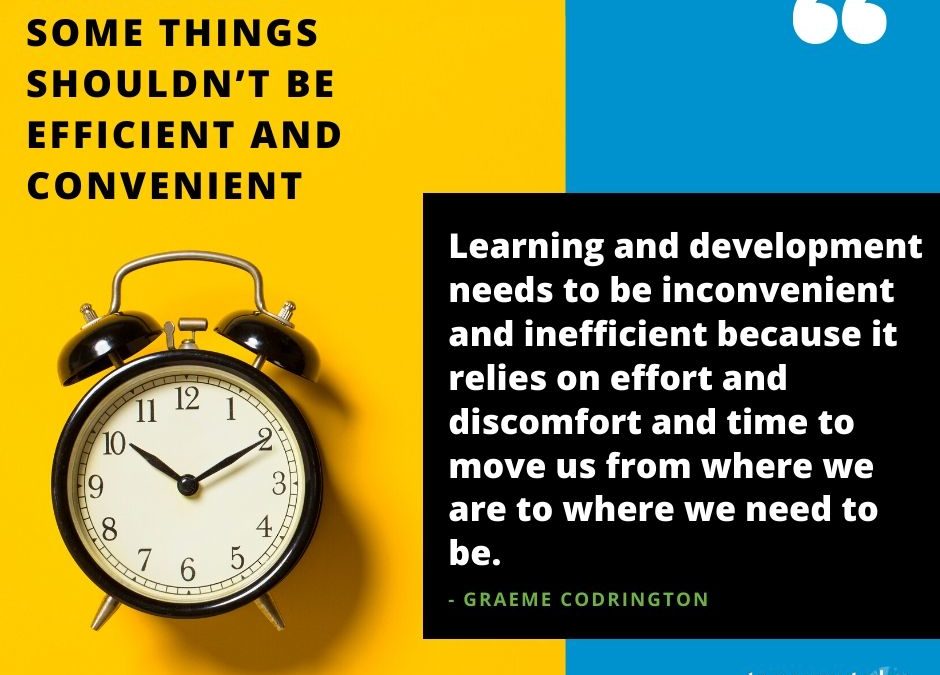We live in a world driven by efficiency and convenience. Our smartphones drive this obsession even more than anything else in our world. Three clicks maximum to do just about anything.
Convenience and efficiency sell.
It has actually been like this for some time now. From fast food drive-throughs to microwave ovens, from the remote control to Twitter as a means for exchanging ideas. And at work, it’s what you experience when a colleague leaves and is not replaced, but their work still needs to be done, or when your boss celebrates last year’s good results by increasing your targets yet again for the year ahead.
On the one hand, there is value to this drive to convenience and efficiency – it has given us the world we live in, with cheap goods always available. But a big downside is that we unthinkingly apply this mindset to every aspect of our lives – some parts of life don’t work well when the focus is on convenience and efficiency.
Today’s Tuesday Tip is for you to analyse which parts of your life need to be inconvenient and inefficient – by design and choice.
I’d suggest at least three:
- Education and personal development. Convenience reduces education to 5-minute video chunks, multiple-choice questions, standardised test, rigid curricula, one size fits all training – you know what this looks like, from school to corporate training workshops. Convenience and efficiency search for safe sessions, where we sit in classrooms thinking about things or reading summaries and case studies, instead of experiencing or actually doing it.
When we do these things we confuse the convenience of saving time with the false convenience of not extending ourselves or false efficiency of avoiding truly growing through deep experiences that take time and can be messy. We confuse the efficiency of having a structured programme that is controlled and contained with the efficiency of learning experiences that invite participants to enter unknown spaces and learn how to navigate these for themselves.
Learning and development needs to be inconvenient and inefficient because it relies on effort and discomfort and time to move us from where we are to where we need to be. At its best, education is about exploration, effort, engagement. This is for our children at school, and ourselves at work.
Read more about leadership development in our updated and newly released book, Leading in a Changing World (by Keith Coats and Graeme Codrington). Available on Amazon in paperback, Kindle and Audio. - Your health – physical and mental. It is inconvenient to go to gym, to run, cycle or swim. It is inefficient to take time out for mindfulness and meditation, for retreat time and silence. But all of these things are necessary to fuel the machine that is your mind-body-spirit. I honestly don’t think I have to say more, except that if you are still trying to convince yourself that you don’t have time to look after yourself, you really haven’t been paying attention lately.
- Personal relationships. Many of the management gurus I grew up reading and listening to back when I did my DBA and was early in my career and developing my base level of business knowledge are now in their later years and writing some remarkable books on what really matters in life. Clayton Christensen’s “How Will You Measure Your Life?” and Charles Handy’s “21 Letters on Life and Its Challenges” jump to mind, but there are many others. In these books, these business gurus reflect on life and work, and they all say the same thing: you will regret not putting relationships at the centre. Once all the money has been made, the profits recorded and the business accolades handed out, the thing that really endures in your life are the people. Family and friends who are there to share life’s journey with you.
It can be inconvenient to prioritise a child’s birthday party or school activity. It is inefficient to take family holidays. It doesn’t fit into your neat schedule to visit sick friends, have a meal with someone you haven’t seen in a while, reconnect with school friends, or any of the many things you can do to build a solid network of people to share your life with. But in the end, it is these people and your connection with them, that will determine how good you feel about your life. Don’t think you can out this off until after everything else is done. You can’t.
What else would you add to this list for yourself?
By the way, REAL innovation and REAL change (change that affects the whole system, and doesn’t just tinker with how things look and feel for a short time) are hugely inefficient and very inconvenient. That’s why we use the descriptor, “disruptive” when talking about them.
You cannot expect to really get transformational innovation without messing up the current reality and flow. This Tuesday Tip is not just for you in your personal life – it applies to your business as well. Take some time out to think about that!
Graeme is an internationally recognized futurist, specializing in the future of work. He helps organizations understand the forces that will shape our lives in the next ten years, and how we can respond in order to confidently stay ahead of change. For the past two decades Graeme has worked with some of the world’s most recognized brands, travelling to over 80 countries in total, and speaking to around 100,000 people every year. He is the author of 5 best-selling books, and on faculty at 5 top global business schools.


